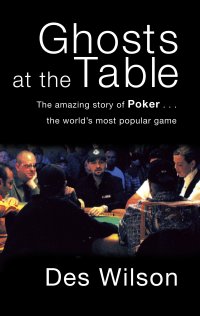Ghosts at the Table: Excerpt 1/4
Extract one from Des Wilson’s ‘Ghosts at the Table – the amazing story of poker’ published by Mainstream on October 4.

Ghosts at the Table
Nearly all the big names in poker history, the legendary fraternity who in the 1950s to 1980s achieved world-wide fame as ‘the Texas road gamblers’ and went on to dominate both the World Series and the game’s Hall of Fame, were outlaws, their nomadic and often dangerous lifestyles not that dissimilar to their 19th century Wild West predecessors, except that the Texans travelled by car rather than horse.
For them poker was not just about playing cards; it was about endless hours driving country roads, “fadin’ the white line” from gas station to gas station, town to town, motel to motel, and game to game… it was about identifying and beating cheats, coping with police raids and arrests, and surviving hijackings and shootings. Winning at poker was the easy part; getting out of town with the money was the real challenge…
…unlike those who today play in front of attentive crowds and television cameras, the Texas road gamblers played in dark corners and dangerous places, protected only by the way they handled themselves (and, if necessary, their guns). “Fadin’ the white line” demanded courage, an acceptable personality, and stamina. While there were some big games and sometimes some big wins, often the pickings were relatively small, and from them expenses had to be covered, and, by some, families kept. As well as the long, tiring journeys and countless days spent waiting in soul-less motel rooms for the game to begin, there were sometimes crushing defeats. To survive they had to be hard men, capable of doing whatever they had to do to survive in hard times.
Amarillo Slim says that to be a road gambler you had to do four things:
- Find the game
- Beat the game
- Not get arrested
- Not get robbed.
In the 50s and 60s most towns had a game if you knew where to find it, and a man known as “the boss gambler” to control it. He was a tough character in a world of tough characters – it was he who decided who could play in town, it was he who kept order, and it was he who paid off the police and the judges. If he didn’t like you, at best you would be frozen out of the game, at worst you could get arrested by his friends in the force. If you were approved, you played poker untroubled by the law. Often he had a respectable front: the only way that poker could be played legally while allowing a house charge or ‘rake’ for the promoter was if it were licensed to be played in a club with a charitable purpose, so AmVets, Elks, and Redmen clubs were all used as fronts for poker.
Sometimes the games would be in a shady den, out the back of a bar or liquor store, or in a barn; usually they would be in the boss gambler’s or houseman’s home, with good home cooking and plenty of liquor for the few who liked a drink while they played.
Normally there were three kinds of players in the game. There were the locals, some of them small-time recreational players, some semi-professionals; there were the road gamblers, the real professionals, who drove the length and breadth of the state, seeking out the bigger games; and there were the ‘producers’ – wealthy amateurs who were the prime target of the pro’s, often men who had made fortunes in oil or gas, or were big ranchers…men who worked hard to make their money and were ready to play hard with it, who loved a game of poker and were ready to pay for it.
There were about 30 or 40 road gamblers in Texas, nearly all of whom were world class players. Some stuck to their own territory –east or west or south of the state; others travelled the length and breadth of Texas, sometimes beyond it, some with partners, some alone. All were looking for a ‘good game’ and that meant one with serious money and that, in turn, called for at least one, and hopefully more, significant ‘producers’ at the table…
…hijackings were an accepted hazard of the business. Poker players were an ideal target because they were outlaws; they couldn’t call the police for help. If they were halfway clever, the hijackers couldn’t lose. Where else could they find piles of cash sitting on the table and no protection from the law ?
The stories are many and colourful. The door would just burst open, the hijackers would be masked and carrying guns, and usually they would force the players to undress and leave them in their underwear so they couldn’t easily follow them to the getaway cars.
